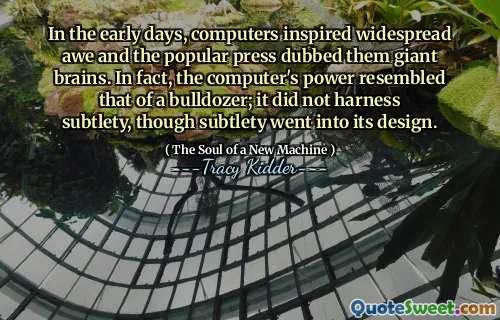
Computer Power and Human Reasonという本の中で、MITという名前のコンピューターサイエンスの教授であるJoseph Weizenbaumが、彼がプログラムへの強制と呼んでいるMaladyについて書いています。彼は、乱れた乱れた若い男性として苦しんでいることを説明しています。多くの場合、沈んだ輝く目で、コンピューターコンソールでの全能性の空想的な空想を演じています。彼らは機械に座って、彼は腕を張って、指を発射するのを待って、すでに攻撃する準備ができているのを待っています。
(In a book called Computer Power and Human Reason, a professor of computer science at MIT named Joseph Weizenbaum writes of a malady he calls the compulsion to program. He describes the afflicted as bright young men of disheveled appearance, often with sunken, glowing eyes, who play out megalomaniacal fantasies of omnipotence at computer consoles; they sit at their machines, he writes, their arms tensed and waiting to fire their fingers, already poised to strike, at the buttons and keys on which their attention seems to be as riveted as a gambler's on the rolling dice.)
「コンピューターの力と人間の理由」で、MITの教授であるジョセフ・ワイゼンバウムは、彼が「プログラムへの強制」と呼んでいるという強迫観念について説明しています。彼は、この状態に苦しんでいる個人を、しばしば沈んだ照らされた目で、華麗でありながら乱れた若い男性として描いています。これらの個人は、コンピューターに座っている間、権力とコントロールの壮大な空想によって消費され、手元のタスクに焦点を合わせています。
weizenbaumは、これらのプログラマーのほぼ順応性のある振る舞いを強調しています。これらのプログラマーは、緊張した身体的姿勢を示し、キーとボタンに熱心に取り組む準備ができています。画面への固定は、ローリングダイスの結果に固執したギャンブラーの固定に似ており、テクノロジーとプログラミングとの深い、ほとんど強迫的な関与を強調しています。











